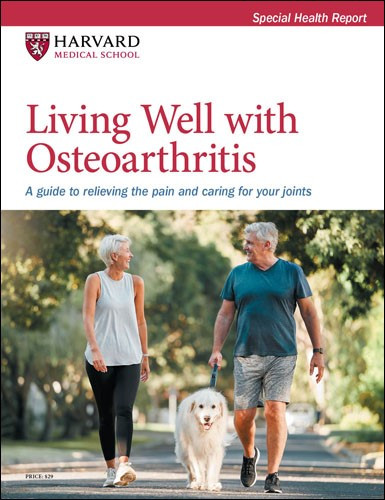Injections for knee osteoarthritis might not cause damage
In the journals
- Reviewed by Howard E. LeWine, MD, Chief Medical Editor, Harvard Health Publishing; Editorial Advisory Board Member, Harvard Health Publishing

Many people with knee osteoarthritis gain temporary pain relief from joint injections. However, there is an ongoing debate about potential long-term risks associated with regular steroid knee injections. Results of a recent study suggest that the risk from these injections may be minimal if done infrequently.
Researchers looked at 564 people with knee osteoarthritis, ages 40 to 75. Of these, 150 had steroid or hyaluronic acid injections an average of twice over five years, with the rest having no injections. At the follow-up, the patients treated with infrequent steroid injections had a similar risk for knee replacement compared with untreated patients. The results were similar for those treated with hyaluronic acid.
For people with osteoarthritis who have occasional painful flare-ups, this study offers reassurance about some long-term consequences of limited steroid knee injections. However, it does not answer all safety questions. The results were published online March 14, 2022, by Arthritis & Rheumatology.
Image: © Edward Olive / EyeEm/Getty Images
About the Author

Matthew Solan, Former Executive Editor, Harvard Men's Health Watch
About the Reviewer

Howard E. LeWine, MD, Chief Medical Editor, Harvard Health Publishing; Editorial Advisory Board Member, Harvard Health Publishing
Disclaimer:
As a service to our readers, Harvard Health Publishing provides access to our library of archived content. Please note the date of last review or update on all articles.
No content on this site, regardless of date, should ever be used as a substitute for direct medical advice from your doctor or other qualified clinician.
















